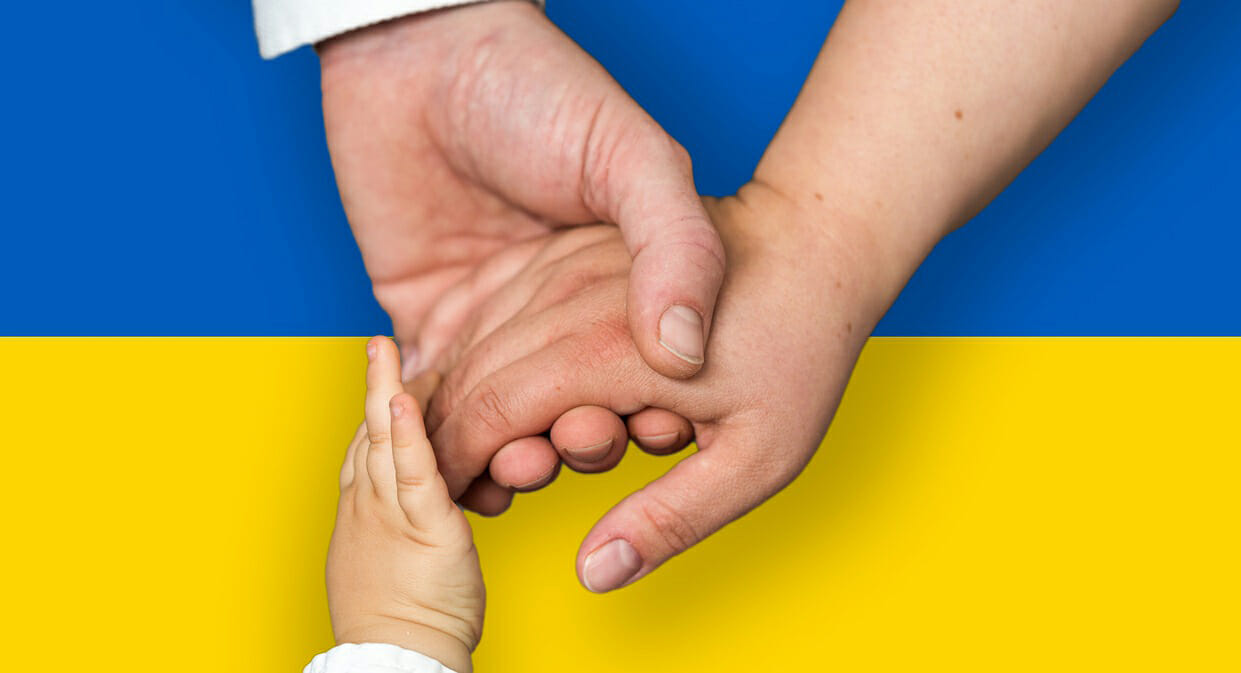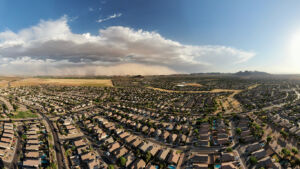The war between Russia and Ukraine affects some more than others. Even some Americans and people in Arizona are feeling the shock generations after immigrating.
“It’s more Russia taking aggression on Ukraine and trying to get what they want. The anger that I feel is not toward the people. It’s their government,” said Ivana Klymko, 21.
People in Ukraine are most directly affected by the Russian invasion, but there are some here in America and even Arizona who are affected even generations after leaving Ukraine and Russia.
READ ALSO: Ukraine is as close as your bank account: Tips to protect yourself
Klymko’s family is half Ukrainian. She is a student in her junior year at the University of Arizona studying the medical field while working as an emergency medical technician. Over 90 years ago, her grandmother fled World War II for Argentina at just six years old.
“We would be looking for shelter versus going to school,” she said. If her grandmother hadn’t left, she said they might be seeing this war first-hand with some of her other Ukrainian family. Klymko has a distant relative who was drafted to fight for Ukraine. She said he has a wife and kids who are waiting for him to come home safely.
She doesn’t believe that the U.S. should put more people at risk by intervening with force, but that something still needs to be done. The sanctions, she said, have been “a very good method of doing as much as you can without getting involved… but so far we haven’t seen Russia budge.”
Her aunt is particularly affected here among her family in Arizona because both of her parents were Ukrainian. “It seems like Ukraine is really open. Russia, I think their actions show more what their goal of the war is,” Klymko said.
“I think for the most part, most of the Russian soldiers don’t really want to fight that much either because probably half of them have family in Ukraine anyway,” said Michael De Lima, 21.

De Lima is half Russian and he has family in Russia, Ukraine, and even Crimea. His mother came from Russia before he was born. He said he likely has family on both sides of this, but “They don’t really talk about it because I guess you don’t really talk about that stuff when you’re over there.” As far as he knows, De Lima said his relatives are safe.
His family watches news from Russian and American sources. “That’s why I have a hard time really having an opinion about anything,” he said, “The Russian news is the polar opposite of the American news and the American news is the polar opposite of the Russian news, so obviously they can’t both be a hundred percent accurate.”
“I get two sources of information, so I’ve chosen to take the agnostic view, accepting that probably both sides are heavily biased toward their own side,” De Lima explained how different these two perspectives really are.
“The brief version I’ve heard from my family on the Russian side is that basically there’s a bunch of Ukrainians that are fighting against their own. From what I know, some parts of Ukraine used to be part of Russia. Then they formed their own country and —according to the news, I’m not saying this is what I think— the Ukrainians that are now Ukrainians instead of Russians…are getting heavily taxed and half of Ukraine wants to be back with Russia and the other half doesn’t. So then, obviously the Russians decided to help the Ukrainians that want to be part of Russia. And then that caused turmoil because now it makes it look like there’s Russia versus Ukraine. So Russia’s helping. That’s the story I’ve heard from the Russian side.”
“I think the Russians greatly underestimated the Ukrainian will to survive this invasion. I also think they greatly underestimated the world’s negative response,” said Gordon James, a U.S. Army veteran.
James owns Gordon C. James Public Relations in Scottsdale. He served in the army during the Vietnam War. James also worked with former President George H. W. Bush and his son, President George W. Bush during his time working in the District of Columbia. Then he worked for the U.S. Department of Defense in Iraq during the early 2000s conflict in the Middle East.
James recalled the diplomatic steps the U.S. is taking to help Ukraine. He said “There has already been a huge investment by the United States government in armament and humanitarian aid. The sanctions imposed are also having a direct impact on Russian civilians. My hope is that President Putin is getting the message.”
He noted that there are over four million refugees coming out of Ukraine as a result of this “humanitarian crisis,” he called it, “I hope that current negotiations will lead to some sort of cease fire.”
His biggest worry is what Russia might do through Crimea after they annexed the country in 2014. “I am praying that this ends quickly. It seems that Putin is trying to get a landline to the sea through Crimea. The Ukrainians may give in on this,” James said.
“Russia appears to be targeting civilians either indiscriminately, or even worse, quite deliberately. There is recent news of negotiation progress, but it’s too early to know if Russia is sincere in its offer to allow Ukraine to join the EU,” said Timothy Peterson, an Arizona State University Professor.
Peterson teaches at the ASU School of Politics & Global Studies. He has expertise in political science and has written many academic journal articles as well as a book on the economics of global politics.
“Russia is engaging in a strategy it has long employed: attrition warfare. The Russian army is not very well trained, and suffers from a very top-down hierarchical command structure that precludes unit-level initiative. Russia’s strategy, therefore, is to continue throwing its troops into the “meat grinder” of combat while hoping that the other side will wear itself out first.
“The U.S. will provide aid (including military aid) to Ukraine and has been surprisingly successful in rallying cooperation to impose severe sanctions on Russia.” Even though Russia attempted to “sanctions-proof” its economy, the extent of collaboration on sanctions will likely lead to a massive economic downturn and make it quite difficult for Russia to maintain its military equipment, which relies on Western-supplied parts, over time. China could very well step up to counter US-led sanctions, but I think it would take time for China to mobilize to replace the Western-made components that Russia relies on.
Putin has been clear that he sees the dissolution of the USSR as a mistake. I don’t think Putin wants to reestablish communism per se, but does desire an authoritarian Russian empire that incorporates the “near abroad” —including not only Ukraine, but the Baltic states and other former Soviet republics. As long as NATO’s commitment to defend the Baltic states remains credible, I don’t see Russia invading there unless Putin has lost all reason and no longer wants to avoid nuclear war. Some have argued that NATO expansion provoked Russia, but it’s worth noting that Russia specifically targeted a non-NATO member. NATO appears to be engaging successfully in extended deterrence. But of course, Russia is also successfully deterring NATO from intervening directly in combat to support Ukraine.
I think the Russian invasion of Ukraine has sparked a major threat perception by Western states that might reinvigorate multilateral cooperation against illiberalism. It’s too early to tell; and even sustained cooperation would be bittersweet given the suffering by Ukrainian civilians that was required to achieve it.”
Even Victoria Spartz, an Indiana state representative has been vocal about her connection to the war. She was born in Ukraine and came to America with her husband in 2000.
“They are fighting this war not just for them, but for all of us. Please keep them in your thoughts and prayers and be vigilant in our fight to preserve our freedoms for our children and for all people who died for them. We are a strong country of free people and always will be!” Spartz said in a Feb. 24 press release.
Author: ChristyAnn Hanzuk is Ukrainian. “This story is in support of those who are suffering through this experience, and from the blessed standpoint of a person whose ancestors left to flee World War I for America,” she says. “Because of them, I get to write in free speech. I owe it to them and those who are still in Ukraine to tell the story I’m a part of. Боже, благослови нашу свободу.”




